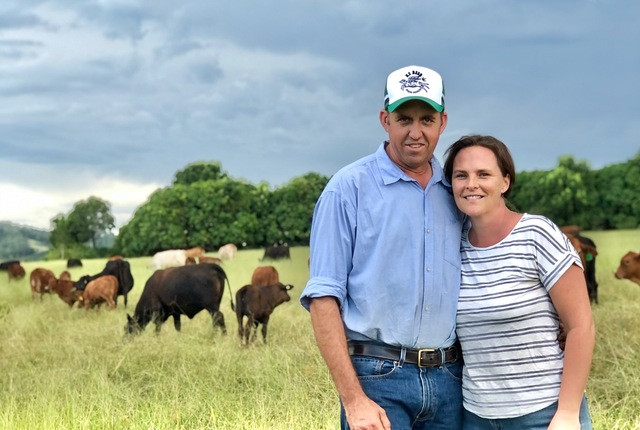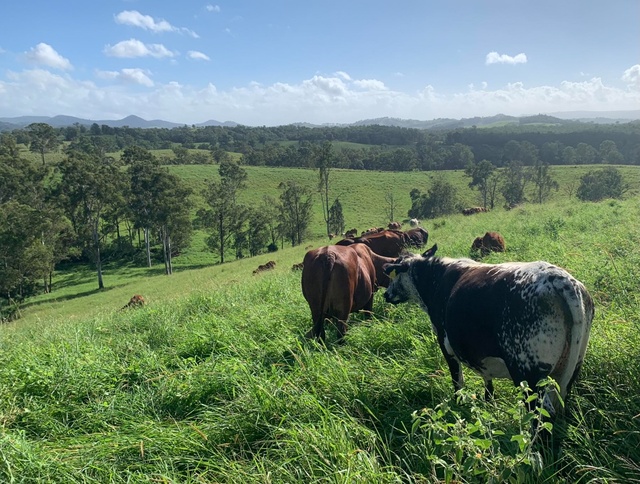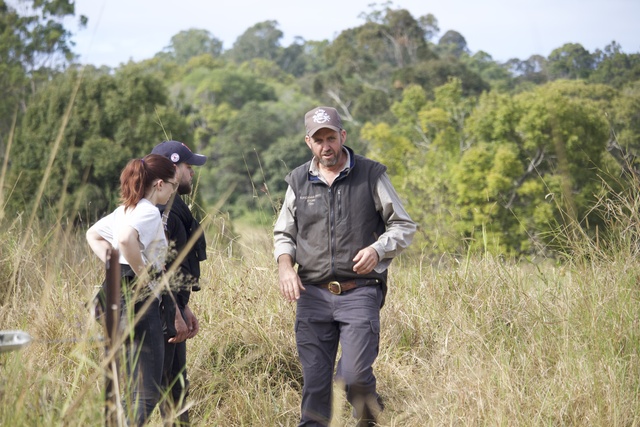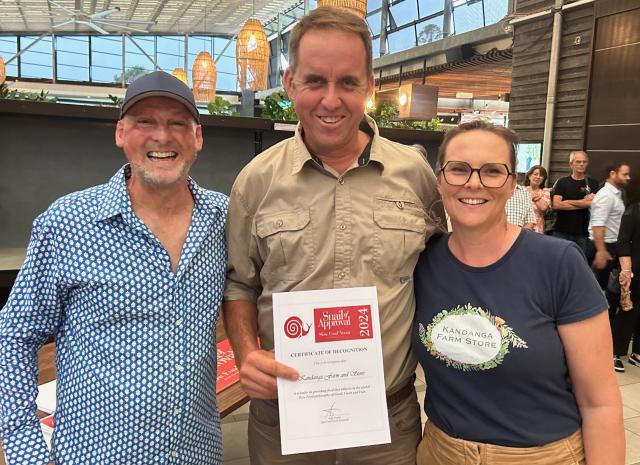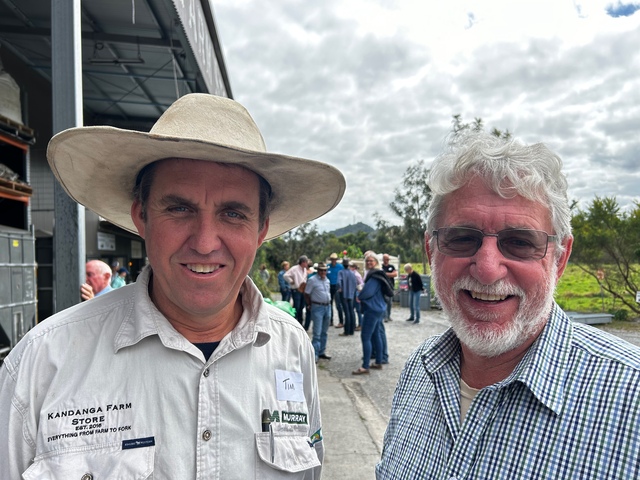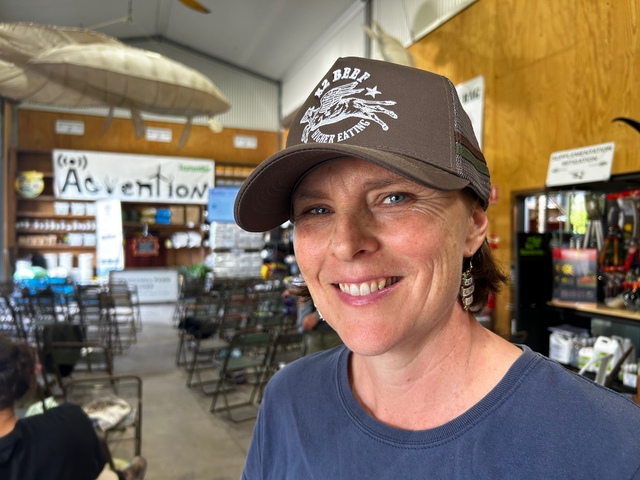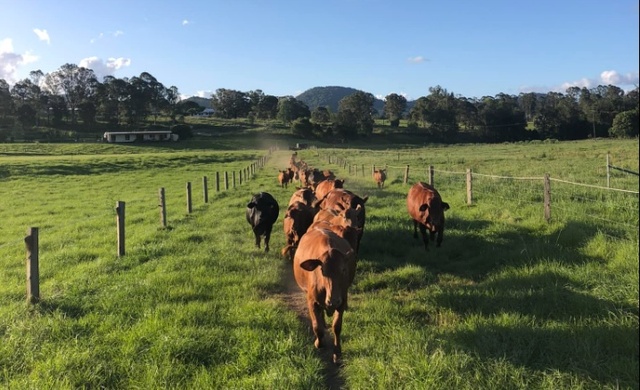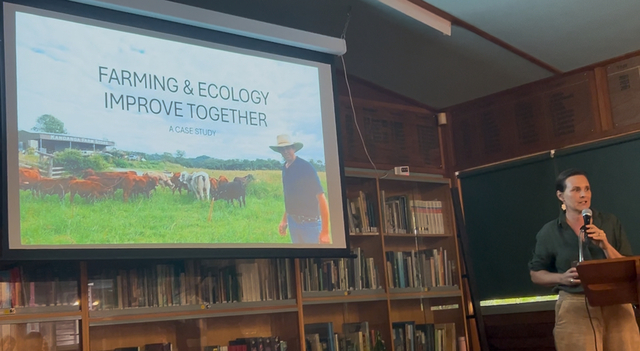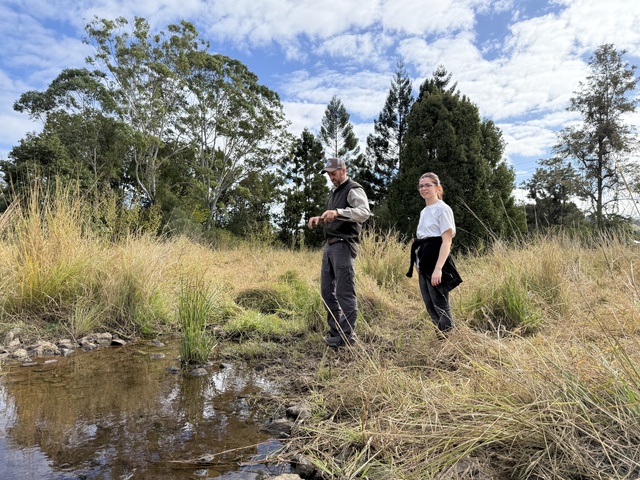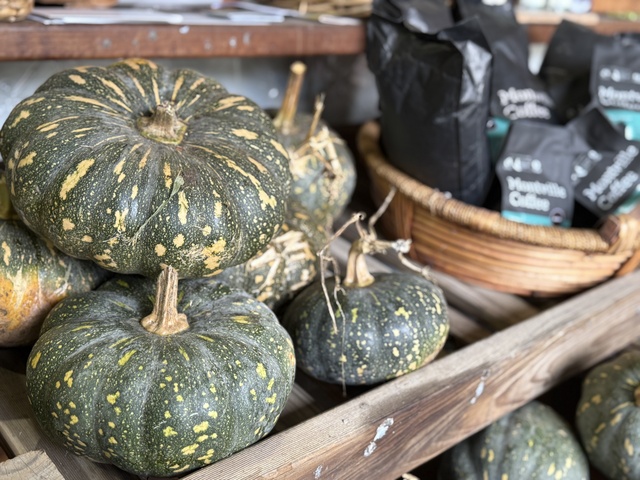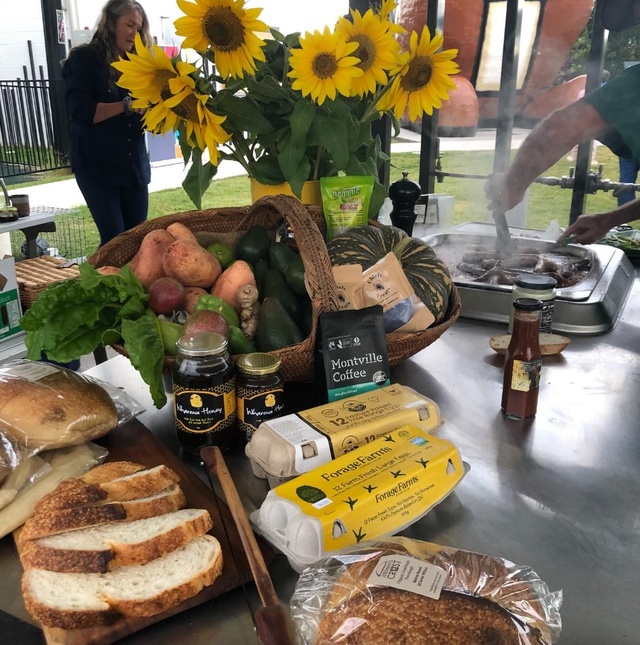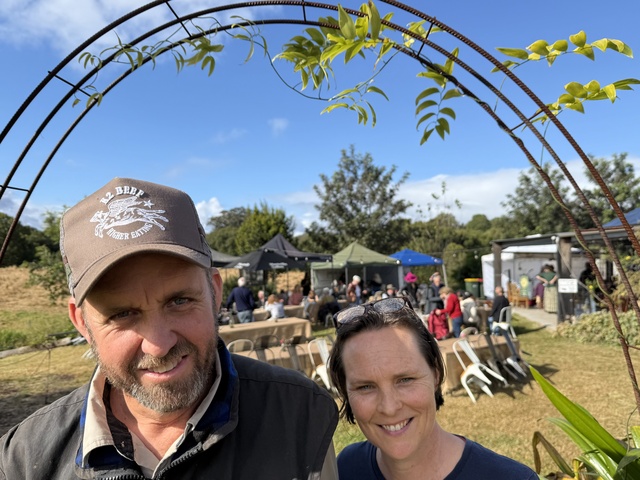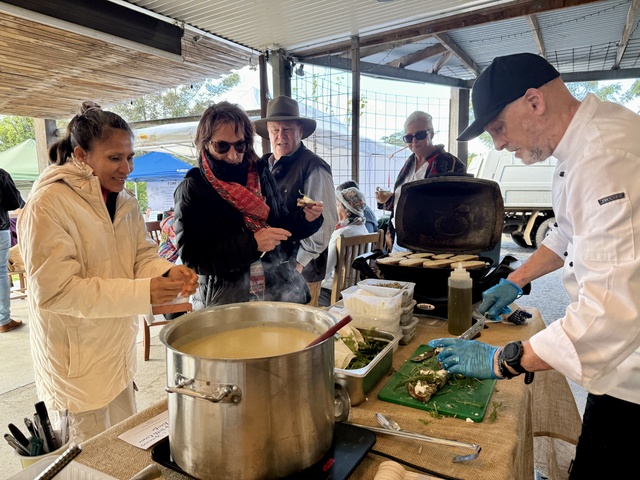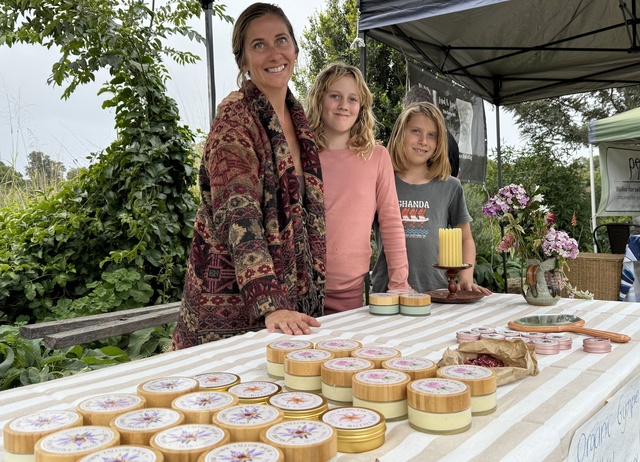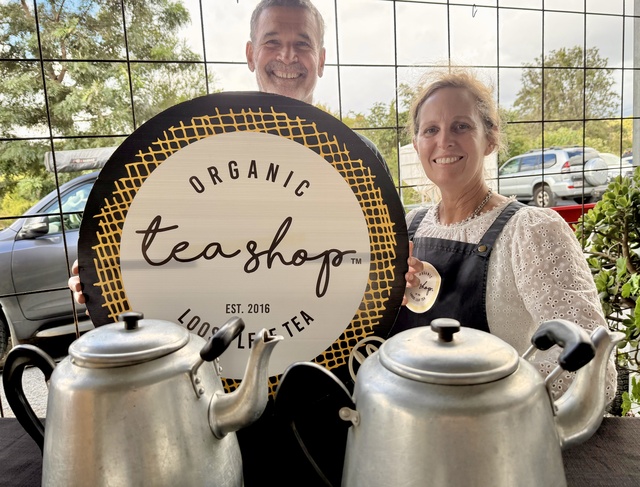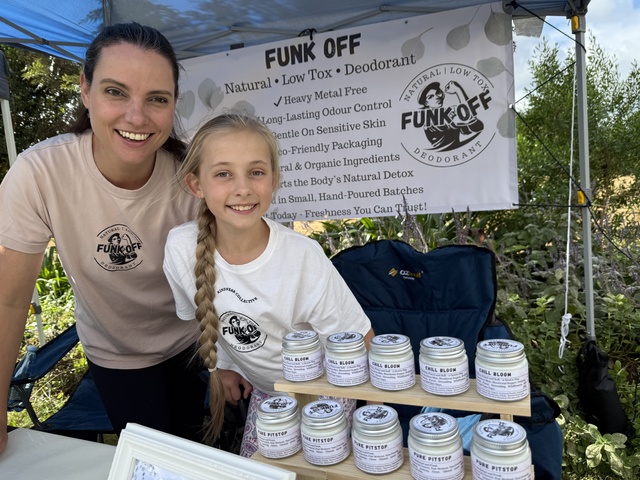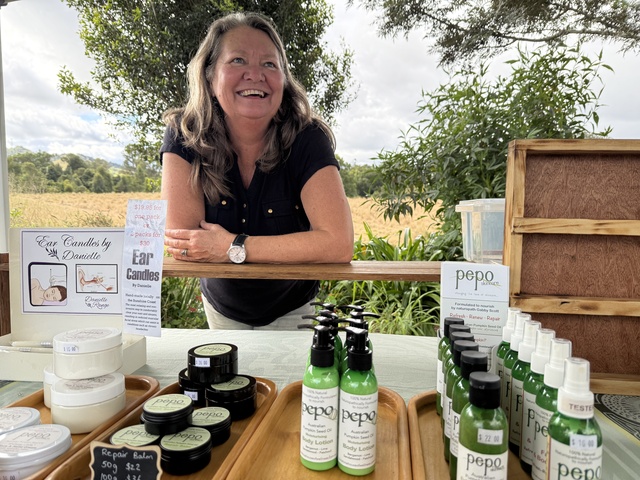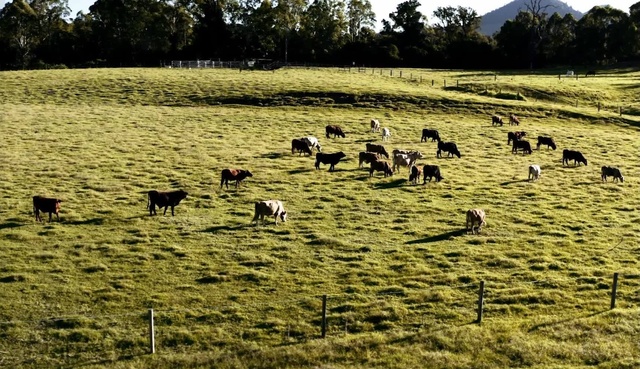In an Australian first, Mary Valley farmers Tim and Amber Scott have been accepted into Slow Food Farms, a world-wide movement to foster good, healthy and fair farming methods. ERLE LEVEY was at Kandanga to talk about what this means for consumers and the wider community.
Care for their livestock, the soil and involvement in the community has seen Mary Valley farmers Tim and Amber Scott recognised in an Australian-first by Slow Food International.
Tim and Amber, who run Kandanga Farm Store and K2 Organic Beef, have been accepted into Slow Food Farms to encourage good, clean and fair food for all by utilising sustainable methods.
Slow Food is active in more than 150 countries and the Scotts are among some 60 farms to date who have been recognised for their philosophy.
Kandanga Farm Store is the only rural store in Australia that focuses on organic and regenerative food production. Tim and Amber are also farmers in the Mary Valley, running about 350 head of cattle on four holdings.
They are both proud and excited at what they are doing within the community – the farm store acting as a hub for seminars in agroecology as well as events to celebrate healthy food.
After being recognised as a nation-wide voice for organic, regenerative, syntropic and holistic farming, being accepted by Slow Food Farms is validation of their vision, hard work and ethics.
Yet the Slow Food acceptance also comes from the way they are connected with the Mary Valley community.
The announcement will have world-wide impact in growing awareness of the clean, green and healthy way food can be produced in Australia.
It will also act as inspiration for farms with similar direction to apply for the status.
Agroecology is sustainable farming that works with nature. It’s about how to design and manage sustainable food and farming systems, with methods that increase yields while reducing environmental impacts.
Slow Food Farms are a tangible example of how agriculture can be both environmentally friendly and deeply connected to local communities.
Each farm in the network embraces the principles of Slow Food, promoting biodiversity, adopting agroecological practices, and fostering strong ties to the land.
“We haven’t changed anything to get Slow Food Farms accreditation,’’ Amber said.
“It could be used by other farmers if they wanted – or were prepared to change their activities.
“For us, we were already doing it.
“There were questions about chemical use, and obviously we are organic. Animal welfare was very high on the criteria, such as how calves are handled.’’
The use of sheds for keeping livestock in the harsh northern hemisphere winters came up but Amber explained they are not needed in Queensland.
“We have complete solar power – portable solar fencing units, solar-powered water pumps, and the investment in solar for refrigeration.
“The other really interesting thing was the social implications and contributing to community, which is really lovely.’’
Slow Food Farms are set to become the largest global network of farms dedicated to producing good, clean and fair food in a way that’s rooted in agroecological principles.
Aligned with Slow Food’s philosophy that everyone deserves access to nourishing food that supports communities and strengthens local economies, these farms are designed to embody the future of sustainable agriculture.
This is in contrast to farming and food distribution systems that affect biodiversity loss and the depletion of vital natural resources, while deepening social inequalities – small farmers and communities can be put at risk by corporations, all the while grappling with natural disasters, health crises and unstable markets.
Meanwhile, consumers are often left with limited access to sustainable alternatives.
Slow Food unites all those who believe in producing and consuming food with respect for people, animals and the planet – from farmers to food artisans to conscious citizens.
A Slow Food Farm is cultivated for agricultural purposes according to the principles of agroecology, used for growing crops and/or for raising animals for human consumption. It may include a processing unit but cannot be solely for processing.
By integrating farms into resilient local food systems, Slow Food Farms not only enhance farmers’ livelihoods but also ensure fair compensation and long-term economic stability.
It respects fairness to farm or production workers as well as to customers in regarding safe working conditions and pay, and proper prices being paid for food at markets and retail outlets.
Tim and Amber started the farm store in 2015 in the house across the road, and then built on the present site. They moved into the store at the end of 2017 and have since developed their K2 Organic Beef operation.
Their move down the regenerative farming route had no definite starting point, rather something that evolved over time from their individual backgrounds.
“I don’t know why it happens but it does seem to help contribute to a better social network and outcomes for people within community,’’ Amber said.
“It’s the way you think – sharing knowledge, we’re running farm-based events as well as food-based events which again has more community building.
“We are creating opportunities for other people.
“There is a local woman who collects the tallow that comes from animals and makes it into skin-care products, so that’s part of the social network.
“Slow Food Farms really liked this cross-pollination of ideas – of people coming to the store and farm, whether that be customers or backpackers for work.
“It’s really interesting, especially exchanging ideas with the European ones.’’
Tim grew up on the land at Roma in Western Queensland and organic methods were more of a necessity for his parents than a decision. It was open grazing land and the cost of chemical pesticides as well as synthetic fertilisers was prohibitive.
Amber was from Brisbane but has always had an interest in food.
They met at university and have continued to research organic and spray-free methods of farming with their business at Kandanga.
“I actually found it challenging at uni because it was nothing about holistic farming or learning from nature,’’ Amber said.
“There was nothing about learning from nature. It was all about chemistry.
“I studied business so didn’t know about chemical issues.
“To me, agri-business was all about what you did at the farm and when the foodstuffs left the farm.
“It wasn’t actually about how you build resilient farming communities or how the farmer is actually the first part of the chain of civilisation.
“Without farmers we are hunter-gatherers. They are fundamental to societal resilience, people’s wellness and well-being, as well as their own happiness.
“The idea of using poisonous elements to grow food has completely baffled me forever.
“I don’t understand how we can say ’but that’s a good environmental outcome for human health, a good outcome for animals, a good outcome for the environment.’
“It just does not make sense.
“This planet is all we’ve got, so we have to work as part of the ecosystem.
“If you’re a responsible farmer you’re actually maintaining that.’’
A lot of attention is paid by Amber and Tim to provenance – where the food comes from, who produces it and how it is produced.
You can see this at the food section of Kandanga Farm Store, and on the menu at food events with those details displayed.
“We get to know those people and and we engage with them,’’ Amber said.
“I think it’s important to utilise local produce but this could be done throughout Australia.’’
The Slow Food Farms recognition is a great step, Tim said, to be recognised for their effort.
“It’s about the process. The judging is quite in-depth and this is even with having organic accreditation.
“The assessment includes energy use and distance to markets. There are other matters that are not covered through other regenerative certification systems.
“I think it was the most comprehensive of all the different verifications we’ve been through. So that’s why we’re excited about it.’’
Such is the attention to Slow Farms that Tim, Amber and their family have a plan or 2028 for there to be no motorised vehicles on the properties.
It’s things like the energy system that impressed the accreditors.
That and the distance to market now that K2 Organic Beef are doing their own processing of meat.
“You can have a regenerative or organic certification and still be trucking cattle from the centre of Australia to market,’’ Tim said, “and those poor animals sit there for three days, four days.
“Processing at Kandanga doesn’t allow that.
“So this recognition is really targeting the consumer I think – what consumer expectations are instead of trying to skirt around the edges.
“It’s about validation of our operation and inspiration for others.
“This gives a good framework for people to work towards.’’
Tim is giving one of the four properties used for grazing a rest for 12 months so the soil, together with the variety of plant and animal life, can re-establish itself.
He chooses cattle by characteristics, not by breed.
“We want resilient females and beautiful beef. We try for 50 percent British breeds such as Hereford and Angus, and a small amount of African breeds and Bos indicus – Belmont reds are an Australian-produced composite breed.’’
A research and development program From Curiosity to Proof is being carried out to investigate and communicate the relationship between regenerative farming practices and the nutrient profile of K2 Beef.
It recognises that this work is more than just a study – it’s an invitation to create a new kind of evidence: one that connects land, animal, food, and community outcomes.
This seeks to acknowledge a deeper imperative: regenerative and organic farming cannot remain a niche ideal for the privileged few.
If these practices are to shape the future of food, they must become mainstream, measurable, and meaningful – not just for farmers, but for consumers and that we eat for nourishment, taste, and for wellbeing.
The program aims to create a model for certified organic, regenerative beef production and decentralised meat processing in a high-rainfall, subtropical environment.
This includes controlled trials for parasite management, soil and pasture interventions, nutrient profiling of beef, and investigation into animal welfare outcomes of on-farm processing.
There will be investigation of community, ecology and economic outcomes.
At present there is no validated, regionally tailored production model for certified organic regenerative beef in high-rainfall Australia.
The innovative, low-impact approach being taken at K2 Organic Beef is an example of how good, clean and fair farming can be both sustainable and forward-thinking.
The Slow Food Farms accreditation team in Italy commented on how the transportation and food miles strategy was equally impressive, especially considering the Australian context of distance.
They were extremely interested in the research project being undertaken linking soil health, plant diversity, and nutrient density in beef.
“This is very much aligned with some of the work we’re supporting here in Italy.
“Slow Food is advancing a project focused on extensive livestock systems and the value of pastures and grasslands, both from an ecological and nutritional standpoint.
“The collaboration you’re developing with nutritionists, a mycologist, a vet, and even an environmental accountant is fascinating.
“We believe it could provide very meaningful contributions to the broader conversation around regenerative, nutrient-dense food production.’’
Slow Food amplifies the voices of farmers committed to connecting with a global community – including activists, chefs, consumers, food artisans, fishers and fellow farmers.
The Slow Food Farms acknowledgement will enable Tim and Amber to learn more about their passion for growing, sourcing, presenting and appreciating great local food.
Not only are they inspirational and forward-thinking Slow Food Noosa members but are at the heart of the Kandanga community, providing a centre for information and a hub for agroecology.
At the farm store and cafe, people can drop by and make connections with others who have similar outlooks.
“It’s not a trade-off between agriculture and the environment,’’ Amber said. “It’s having both together that makes it better.’’
What the Slow Food Farms recognition shows is that we have farmers in the Mary Valley whose processes are of world standard when it comes to good food, produced fairly and sustainably.
This was done according to criteria that is exacting and verification of what they do … not having to make changes to meet the standards.
It highlights the importance of local food production in terms of food miles, and the future of alternate energy use.
Fundamentally, we are all linked by the need to eat every single day. The quality of what we eat and how it is produced impacts our lives.
Good soil, good food, good health – it’s really quite simple.

